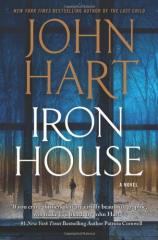Reading Group Guide
Discussion Questions
Iron House

1. The story begins with a vivid depiction of Michael and Julian's childhood at the Iron Mountain Home for Boys, and yet we don't find out the truth about Abigail's childhood until the climax of the book. How did your assumptions about Abigail change as the truth unfolded?
2. The crux of this story is Michael's outlook on fatherhood as a new beginning, a chance for happiness and a moral life previously unavailable to him. Do you think this kind of event can fundamentally change a person – both within the context of the book and in your own experience?
3. In his determination to protect Abigail, Jessup is willing to do almost anything, up to and including breaking the law. Is he right to do so? Why does Jessup care so deeply for Abigail?
4. Throughout the book several characters are haunted by things they've done in the past, though they often acted at the coercion of others and not of their own volition. How does this change your judgment of that character's actions? Examples: Julian is pushed to the brink by the torments of unmonitored and violent bullies at Iron House. Michael finds the only father figure he'll ever know, but is forced to take the lives of others in order to win his approval.
5. There are few characters in Iron House who had the privilege of a traditional childhood. How are the main characters shaped in different ways by their pasts?
6. Explore the different parent-child relationships in the story. How does each relationship evolve throughout the course of the novel? Are there any "good" parents in this story?
7. Given the things he's done, is Michael capable of a moral existence? Does he have a religious faith? Was he ever a moral man? Is he, indeed, more than the things he's done?
8. Psychological disorder figures prominently in Iron House. Some characters are aided by others who recognize their issues and attempt to help them. But there are also cases of unchecked malady, as in Jimmy's uncontrollable violence. How does psychological disorder function in the larger story?
9. Jimmy's feelings for Michael are powerful yet ambiguous. What does he really feel and why?
10. There are significant differences between the way Abigail, Jessup, Julian, and Victorine treat psychological disease. Is this a reflection of the respective age of the characters, and the perception of psychological disorder in which each generation was raised?
11. Was Michael right to let Arabella Jax live? What were his reasons for doing so and were they morally correct?
12. Given all that's transpired, can Michael and Elena be truly happy together?
13. If you've read some or all of John Hart's earlier books, how do you see Iron House in relation to them?
14. How do you feel about the resolution of Iron House?








